

Importance, reasons and strategies older adults should stay active in order to maintain their cognitive abilities. 10 Brain Exercises That Boost Memory. A Whole-Body Approach to a Healthy Brain So what types of exercises benefit your brain?
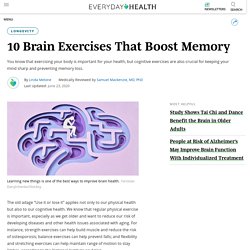
Research shows that when it comes to keeping your mind sharp, exercising your body as well as your mind and sticking to healthy habits is the ideal formula. A study published in July 2019 in The Journal of the American Medical Association followed 196,383 participants age 60 and older who did not have cognitive impairment or dementia when they joined the study and tracked data for eight years on factors such as current smoking status, regular physical activity, healthy diet, and moderate alcohol consumption. They found that a healthy lifestyle was associated with a lower dementia risk among participants, regardless of genetic risk for Alzheimer’s disease and related dementias. How to reduce the risk of cognitive decline with age. Research into how we can keep our brains healthy as we age has gained momentum in recent years.
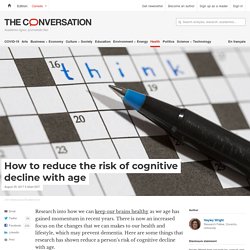
There is now an increased focus on the changes that we can makes to our health and lifestyle, which may prevent dementia. Here are some things that research has shown reduce a person’s risk of cognitive decline with age. Sex Our latest study shows that having more sex is associated with better cognitive function. We recruited 28 men and 45 women, aged between 50 and 83, to take part in our study. The association could be the result of the heightened levels of intimacy and companionship inherent in sexual relationships (that is, an increase in social contact), or there could be a purely biological explanation – where regular surges in arousal and release of sex-related hormones (such as oxytocin and dopamine) could be affecting brain function.
Sleep Many studies show that getting enough sleep is important for preventing cognitive decline. Active leisure Gender equality. Exercise may slow down the brain's aging by 10 years. Physical activity has countless health benefits, including helping to keep the mind sharp.
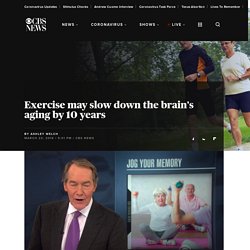
Now new research reveals just how much of an impact exercise can have on brain health as we age. The study, published today in the online issue of Neurology, the medical journal of the American Academy of Neurology, found that older adults who reported either light or no exercise at all experienced a cognitive decline equal to 10 more years of aging when compared to people who were moderate to intense exercisers. "The number of people over the age of 65 in the United States is on the rise, meaning the public health burden of thinking and memory problems will likely grow," study author Dr. Training and Maintaining Memory Abilities in Healthy Older Adults: Traditional and Novel Approaches. We use cookies to enhance your experience on our website.By continuing to use our website, you are agreeing to our use of cookies.
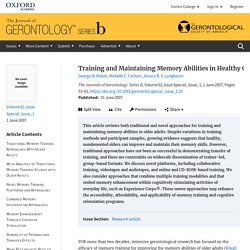
You can change your cookie settings at any time. <a href=" Find out more</a> Skip to Main Content Search Close Advanced Search Search Menu Article Navigation Volume 62 Issue Special_Issue_1 1 June 2007 Article Contents. Eight Habits That Improve Cognitive Function. The New York Times recently published an article about the "brain fitness" business, "Do Brain Workouts Work?
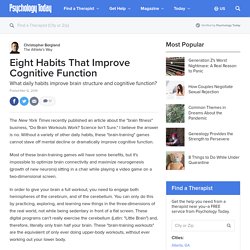
Science Isn’t Sure. " I believe the answer is no. Without a variety of other daily habits, these "brain-training" games cannot stave off mental decline or dramatically improve cognitive function. My personal thoughts #2. Study Shows Link To Rapid Cognitive Decline In Older Adults. Loneliness accelerates cognitive decline in older adults, says a research team presenting at the Alzheimer’s Association International Conference in Washington, D.C.
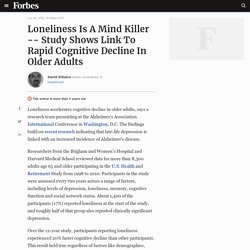
The findings build on recent research indicating that late-life depression is linked with an increased incidence of Alzheimer’s disease. Researchers from the Brigham and Women's Hospital and Harvard Medical School reviewed data for more than 8,300 adults age 65 and older participating in the U.S. Health and Retirement Study from 1998 to 2010. Participants in the study were assessed every two years across a range of factors, including levels of depression, loneliness, memory, cognitive function and social network status. About 1,400 of the participants (17%) reported loneliness at the start of the study, and roughly half of that group also reported clinically significant depression. Over the 12-year study, participants reporting loneliness experienced 20% faster cognitive decline than other participants.
10 Major Signs of Cognitive Issue in Elderly. The natural aging process is impossible to avoid, but its effects go beyond fine lines and wrinkles on our skin.
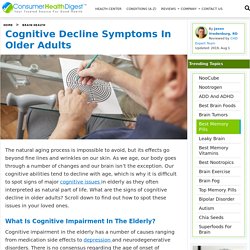
As we age, our body goes through a number of changes and our brain isn’t the exception. Social isolation, loneliness in older people pose health risks. Human beings are social creatures.
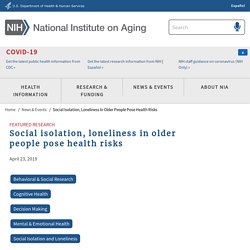
Our connection to others enables us to survive and thrive. Yet, as we age, many of us are alone more often than when we were younger, leaving us vulnerable to social isolation and loneliness—and related health problems such as cognitive decline, depression, and heart disease. Fortunately, there are ways to counteract these negative effects. NIA-supported researchers are studying the differences between social isolation and loneliness, their mechanisms and risk factors, and how to help people affected by these conditions. Age-Related Memory Loss. Worried about your forgetfulness? Learn what’s normal when it comes to memory and aging, and how to recognize the signs of more serious problems. Memory and aging We’ve all misplaced keys, blanked on someone’s name, or forgotten a phone number. When you’re young, you don’t tend to pay much attention to these lapses, but as you grow older, you may worry about what they mean. Perhaps you start to talk about a movie you saw recently when you realize you can’t remember the title.
As you grow older, you experience physiological changes that can cause glitches in brain functions you’ve always taken for granted. Understanding and Alleviating Social Isolation Among Older ... My personal thoughts #1.